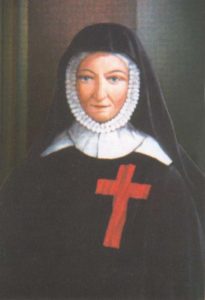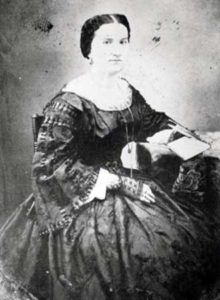By Ausilia Gianesin
 In conformity with required prudence, one can affirm that the above-mentioned (cf. PDF) criteria for credibility are present in the reports of the historical sources on the mystical phenomena whose subject was M. Domenica. At times her biographers engage in pious reflections on the phenomenon and its derivations but it should be noted that they make a distinction between a bare account of the facts and personal interpretation.
In conformity with required prudence, one can affirm that the above-mentioned (cf. PDF) criteria for credibility are present in the reports of the historical sources on the mystical phenomena whose subject was M. Domenica. At times her biographers engage in pious reflections on the phenomenon and its derivations but it should be noted that they make a distinction between a bare account of the facts and personal interpretation.
It should be observed that the allocutions imparted to M. Domenica occurred at the beginning of a new stage in her life. During its various stages, the life of M. Domenica developed along a line pre-established by questions that became charismatic and followed a lineage that did not always conform to the logic of the normal evolution envisaged by human events – events that were unexpected and shocking for M. Domenica and contrary to her innate will. They thus required a strong charge of pain and of sacrifice, accepted, however, subsequently, as the evident will of God.
A century and a half later, with her work carried out according to the design of God, and her mind acquired subsequently by the evening of God, it is possible to judge with certainty on the veracity of those mystical phenomena because of their positive impact on the mission accomplished by M. Domenica during the span of her existence, and beyond.
Specific Facts
The Chalice
- The first fact of a supernatural-charismatic character to be revealed in the life of this servant of God is described by Trinci and by Batacchi. Their protagonist does not make the slightest reference to it in her autobiography because she began this text in the year 1818, ignoring completely all previous events. Tranci wrote: ‘So much piety (towards the Most Holy Mary) was wonderfully favoured by heaven because when little Maria once entered the holy temple to greet as usual the Holy Virgin, in that hour when the celebrating priest was pronouncing the adorable words of the consecration she saw fall the most precious blood, overflowing from the chalice that the priest was raising up before the people. On seeing this our Maria was very much gripped by a holy horror and experienced effects that she could not explain to herself. She prudently kept to herself and maintained concealed this favour received, expressing it only to her confessor. From that moment onwards she sought to grow in virtue and to live solely for that Lord who had so favoured her; she made herself more meek to the teachings of her virtuous teachers, and loved prayer and solitude more’….
Premonitions
- The second phenomenon had a precedent. M. Domenica was going through a period of crisis of growth, with consequent introspection and a spiritual slowness. With the help of her mother, a woman who was strong in human and Christian terms, she overcame that difficult moment; she became engaged and she married. At this point her biographers speak about a painful tension inside her. Chicca (with whom Batacchi agrees) writes: ‘The elevated and fervid mind of Maria, when looking at the first years of her life, her religious practice and piety, her prayers to the Most Holy Mother of God, the alms that she so affectionately gave to the poor, her retreats, and her solitude, made it appear to her that marriage was not the state to which God had called her. Was this a regret of youthful passing or, rather, an internal voice of God that prepared her for those most painful sacrifices by means of which He wanted to call her to great works of religion and charity?’
This statement of the biographers about a purported internal conflict in M. Domenica between God and her husband, whom she had chosen freely and loved deeply, does not correspond to reality.
However, the ‘internal voice of God’, as a supernatural premonition preparatory to a moment of fracture with the whole of her previous life and leading towards a new mode of life, is credible.
A severe trial was about to befall the twenty-two-year old M. Domenica who had been married for just a few months. She was in the flower of her youth, happy with her husband, whom God had given to her, and her joy reached the highest point when she saw that she was expecting a child. But Salvatore, her husband, died just six months after their marriage. For M. Domenica, her life changed radically. Her pain was such as to go beyond all human capacity for resistance. M. Domenica needed extraordinary supernatural help for the will of God to be done in her.
It is in this context that the succession of premonitions and interior movements, about whose mystical nature there can be no doubt, are to be placed. A century later and after the occurrence of facts that were then mystically foreseen, the answer about the nature of those premonitions cannot but be in the affirmative. The Lord, who had called M. Domenica to form a human family, prepared her through a journey of pain to work with Him in the construction of a greater family at the service of the suffering.
- The third phenomenon was related by M. Domenica herself in her autobiography. It is a pre-supposition of a personal and social character. Following the death of her husband, M. Domenica was completely directed towards a spiritual life, a life of prayer and of penance, and of helping poor, sick and abandoned women in their homes. At the same time her confessor entrusted her with being responsible for a group of women oblates of St. Francis of Sales, beginning a foundation that would take concrete form in the creation of the
 convent of the visitation of Saint Mary in Lucca…
convent of the visitation of Saint Mary in Lucca…
Involved with the group of assistants for sick women and of the women oblates of St. Francis of Sales, and faced with the needs of life and the progress of the two apostolic works, a tension had arisen in M. Domenica: could she in an increasing way dedicate time and financial resources to these two apostolic activities, depriving her son of them, a son, indeed, obtained ‘almost miraculously’, who in her had his only human support for the present and the future?
In line with her temperament and her style, this tension had become a conflict. At the height of her interior struggle, she heard the words, which were underlined by her in the text: ‘You will no longer have a son …so you can indeed cooperate with the work of God’. It is not clear whether those words amounted to an intellectual illumination or a phenomenon of the senses. But it is clear that this direct communication with the world of the spirit came to break the chain of happy equilibrium that M. Domenica had been arduously reconstructing after the death of her husband.
She anxiously searched for a solution to her interior conflict but it did not precede, not even remotely, the answer that God was about to manifest to her. The supernatural allocution filled the heart of M. Domenica with anxiety and bitterness and these were increased by the charismatic confirmation of her confessor. From that moment onwards, the thought and the very physical presence of her son – who was young, bursting with health, and endowed with qualities that were not ordinary – constructed in her a lacerating torment, lessened, at times, by thoughts of hope, or worsened by harsh discomfort: a torment later accepted or overcome through a heroic conformity to the will of the Lord.
The description of the ‘fatal day’ of the death of Lorenzo – the fulfilment of the charismatic-prophetic allocution – constitutes one of the most intense pages of her autobiography. One can feel in it the breaking of the heart of a mother who, having already suffered because of the death of her father, her brothers, and her husband, was now present at the last act of a previously experienced tragedy, moment by moment, which culminated in the death of the person who was most dear to her – her son.
Even more with the third mystical phenomenon, the supernatural veracity of the fact is proved both by the literary form of the written account and by the internal dynamic of the phenomenon itself, the fulfilment of a charismatic premonition.
The literary form is brief, essential, one would say brutal in its shocking force.
The internal dynamic is highlighted by the behaviour of the subject of this mystical phenomenon. M. Domenica received an antithetical message; one, indeed, contrary to her will, which wounded her at the centre of her very nature as a woman, motherhood, and she rejected it, ‘characterising it as being born of the imagination’ , whereas she felt in her innermost being that those words were authentic. The last support to which she seemed to attach herself with the force of desperation was her confessor, but there, as well, the words of the revelation found painful confirmation. There followed her acceptance of the will of God; a heroic resolution of faith and love, the answer of M. Domenica to her supernatural message.















Camillians on Facebook
Camillians on Twitter
Camillians on Instagram